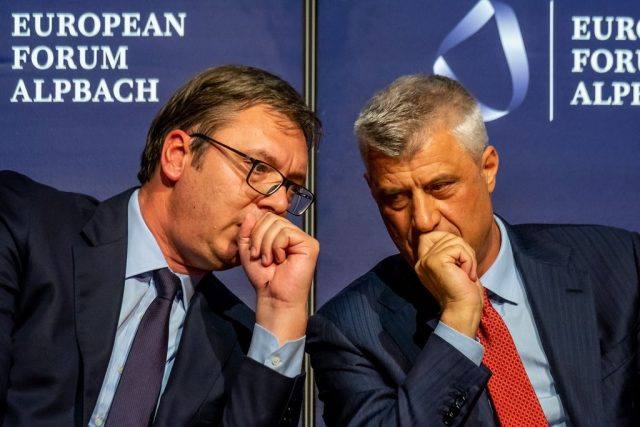The long-debated issue of border changes between Kosovo and Serbia has resurfaced in political and academic circles, reigniting questions about the future of peace and territorial integrity in the Western Balkans.
Back in 2018, then-presidents Hashim Thaçi of Kosovo and Aleksandar Vučić of Serbia publicly suggested, for the first time, that border corrections could be the most realistic path toward reaching a final normalization agreement between the two countries.
U.S. Congress Moves to Block Border Changes in the Balkans
A new U.S. proposal, the “Western Balkans Democracy and Prosperity Act,” introduced by Democratic Representative William Keating, explicitly prohibits any U.S. policy that supports changing borders along ethnic lines in the Balkans.
With 12 articles, the bill outlines that “it is the policy of the U.S. Government not to pursue or support any exchange of territories, partition, or other forms of border redrawing along ethnic lines in the Western Balkans, as a means of resolving regional disputes.”
However, analysts view this initiative as largely symbolic, given its low likelihood of passing Congress and the lack of bipartisan sponsorship.
Debate Over Border Corrections Persists
The idea of “border corrections” or territorial swaps between Kosovo and Serbia has long divided both domestic and international opinion.
In 2018, proposals reportedly involved Serbia gaining control over the Serb-majority areas north of the Ibar River, while the Albanian-majority Preševo Valley in southern Serbia would become part of Kosovo.
Thaçi had stated at the time:
“I believe the moment has come for a definitive correction of borders between Kosovo and Serbia, covering around 400 kilometers.”
This statement sparked fierce reactions from Kosovo, Serbia, and Western governments, many of whom warned that redrawing borders could destabilize the entire region.
Trump’s Pragmatic Approach to Kosovo-Serbia Dialogue
During his first term, former U.S. President Donald Trump appeared open to border adjustments, emphasizing that the U.S. would not oppose a territorial arrangement if both sides reached an agreement.
“If both parties can find a mutually acceptable solution, we will not exclude territorial arrangements,” said John Bolton, then-National Security Advisor, in 2018.
Trump later boasted that he had “stopped a potential war” between Serbia and Kosovo during his presidency, portraying himself as a peacemaker and dealmaker.
However, experts like Charles Kupchan of the Council on Foreign Relations believe the new U.S. administration remains cautious, prioritizing stability, sovereignty, and territorial integrity over risky border changes.
Experts Warn of Dangers Behind “Border Correction” Rhetoric
David Kanin, professor of European Studies at Johns Hopkins University, warned that reviving border change debates could reignite ethnic tensions.
He argued that no serious movement currently exists toward altering borders, but that such ideas remain politically dangerous, particularly given the volatile context of Bosnia and Herzegovina and Republika Srpska leader Milorad Dodik’s separatist rhetoric.
“Proposals for border changes often create instability and division, as seen during the 2018 debate,” Kanin told Radio Free Europe.
Meanwhile, the U.S. State Department recently eased sanctions on Dodik and his allies after the National Assembly of Republika Srpska repealed several unconstitutional laws — a move seen as part of Washington’s limited engagement strategy in the Balkans.
Kosovo Firmly Rejects Any Border Change
The Kosovo Presidency reaffirmed its strong opposition to any “border correction” initiatives.
President Vjosa Osmani has reportedly received consistent assurances from the U.S. administration regarding Kosovo’s sovereignty and territorial integrity.
Presidential adviser Bekim Kupina stated:
“The proposal to block any U.S. support for border changes aligns fully with Kosovo’s position and the principles guiding our lasting friendship with the United States.”
In contrast, the Serbian Presidency declined to comment on the issue when contacted by Radio Free Europe.
A Stalemate Amid Political Turbulence
Both Kosovo and Serbia are currently mired in deep internal political crises, making progress in dialogue or any final settlement highly unlikely.
While Trump’s team may again seek to play the role of mediator, experts argue that neither side is presently stable enough to enter meaningful negotiations.
As Kupchan concludes:
“Any serious discussion about territorial exchange must only happen if both sides genuinely support it — and only if it leads to a sustainable peace.”







